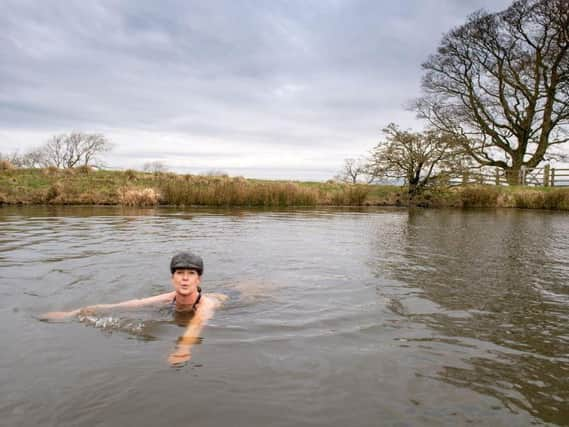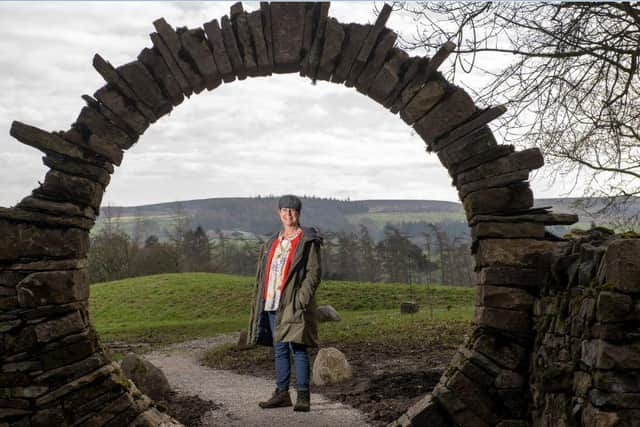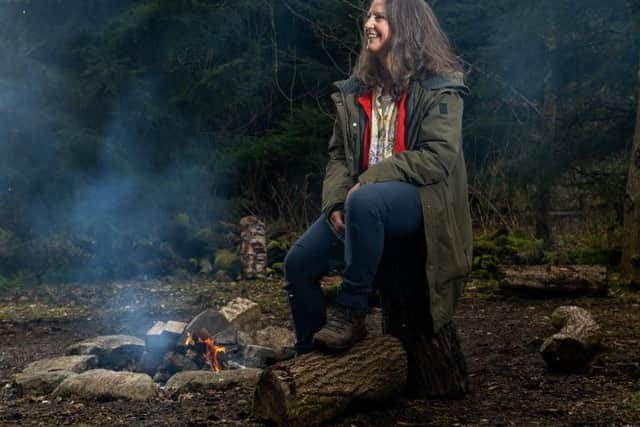Meet the woman who quit law to set up Forest Guru bathing events at Skipton’s Broughton Hall estate


It’s shortly after 11 o’clock on a spring morning. I am sat on a park bench being served a cup of tea via Zoom while raising a toast to nature. The virtual brew is courtesy of Liz Dawes, a former solicitor who is now better known as the Forest Guru, and it brings to a close a session designed to showcase the benefits of taking time to get close to nature. During the previous 90 minutes, I have quietly stared at ripples on a duck pond and spent 10 minutes or so listening to my own heartbeat and taking in the surroundings. I’ve also walked at a snail’s pace around a patch of grass on the lookout for anything that moves, been encouraged to feel the wind on my face and, without looking suspicious, find a convenient hidey hole to tuck myself away in.
As surreal events of the last 12 months go, it’s right up there. However, it’s also an exercise in mindfulness and, according to the growing army of forest bathers, this is how more of us should be spending our days.
Advertisement
Hide AdAdvertisement
Hide Ad“It all began in Japan back in the 1980s,” says Liz, who in normal times leads face-to-face sessions on Skipton’s Broughton Hall estate. “The country had witnessed a massive population shift from the countryside to the cities and in an effort to ensure these rural areas didn’t turn into complete ghost towns they launched ‘shinrin-yoku’.”


Taking its name from the Japanese for “forest” and “bath”, the marketing campaign dressed up as a public health programme encouraged city dwellers to keep in touch with nature. It was a resounding success, but as the residents of Tokyo gamely embraced the concept of forest bathing it also brought some unexpected benefits.
“Medical experts began analysing the impact of forest bathing and the results were pretty astounding,” adds Liz. “They discovered that the practice had the potential to lower the heart rate, decrease blood pressure, reduce stress hormones and boost the immune system.
“It’s in our DNA to live in nature, but unfortunately many people have lost that fundamental connection and that’s what we are trying to restore.”
Advertisement
Hide AdAdvertisement
Hide AdLiz came to forest bathing via a slightly circuitous route. Growing up in Burnley, after a few years living in California she returned home, qualified as a solicitor and spent 11 years practising commercial law in London.


However, in 2012 she had her own road to Damascus moment when she went on a self-help course run by the Hoffman Institute.
“I’d been quite unhappy at work for a while,” she says. “I knew the law wasn’t really for me, but like a lot of people I had fallen into a career and I wasn’t sure how to get out.
“The course was centred around discovering who you really are and how to achieve the life you dream of. Afterwards I knew that if I was ever going to be happy I would have to make some drastic changes.
Advertisement
Hide AdAdvertisement
Hide Ad“I was lucky in the sense I didn’t have children or anyone else who was dependent on me financially, so one day I walked into the office and handed my notice in without quite knowing what I was going to do next.”
Having always had a hankering to live by the sea, Liz sold her London flat and moved to Brighton. However, it was during a month-long silent retreat that the seeds of her future career were sown.
“I loved it,” she says. “Silence is something so many people don’t experience day to day. Modern life is noisy and I really relished the idea of cutting out that background hum.
“If we were really desperate to communicate we used a pen and paper. I know to some people that sounds really restricting, but not having to speak was actually really liberating. I remember at the end of the retreat stepping back into the world and finding it quite grating. Now I spend large chunks of the day in silence; I think it’s important to spend time with yourself without outside distractions.”
Advertisement
Hide AdAdvertisement
Hide AdStill unsure where her future lay, Liz spent the next few years travelling the world, spending extended periods in Nepal, Brazil and India, where she lived for a while in Varanasi, the oldest inhabited city in the world. She describes that period of her life as “magical”, but it was during a later trip to California to visit family that she was introduced to the concept of forest bathing.
“It was there that I came across Sylvie Rokab’s film Love Thy Nature,” says Liz. “Narrated by Liam Neeson, it takes viewers on a journey through the natural world and illustrates brilliantly how renewing our connection with nature is key to our own health and that of the planet.”
Determined to find out more, Liz returned to the UK and enrolled on a training course with the Association of Nature and Forest Therapy. Graduating as an accredited guide, Liz later settled in Skipton and heard about the Broughton Hall estate from a friend.
“It’s absolutely perfect,” she says. “When you’re out amongst the trees it feels like you are in the middle of nowhere, but it’s also really accessible and the team on the estate are really passionate about the importance of nature to wellbeing.”
Advertisement
Hide AdAdvertisement
Hide AdHome to the Tempest family since 1097, in recent years the historic estate has established itself as a leading retreat destination and for a while boasted its own resident philosopher.
Staying at one of the various cottages or the off-grid shepherd’s hut, guests can take part in a range of nature-inspired activities, from wild swimming to foraging and Liz’s own forest bathing events.
“It will be great when we can welcome people to the estate again, but the virtual experiences have worked really well. I wasn’t sure they would, but a lot of people have said that this last year has really made them appreciate nature.
“Our lives have been pared right back and as a result we have learnt to appreciate the small things and for many people one upside has been discovering green spaces on their doorstep. Lockdown has been really difficult, but it has also given people permission to slow down and just be.”
Advertisement
Hide AdAdvertisement
Hide AdOn her forest bathing walks, Liz invites attendees to take part in a series of activities designed to increase their connection with the natural world, whatever form that takes. In our virtual session, two of the group are taking part from the comfort of their living room and when asked to notice everything that is moving, one focuses on a cobweb caught in a window draught.
“Obviously it’s great when people are here and we can sit around the firepit and wander through the trees together,” says Liz. “However, the underlying philosophy of forest bathing is to increase our connection with nature wherever you are and to reignite our curiosity with the world around us.
“As children, we instinctively want to be part of the natural world. We pick up worms, we make dens and we climb trees. As we grow up, we lose that and forest bathing is about recapturing that love.”
To prove the point, Liz, who is also a big proponent of wild swimming, ends our session by asking us to find a place where we can hide away, somewhere we can tuck ourselves away for a few minutes of solitude before that final tea ceremony.
Advertisement
Hide AdAdvertisement
Hide Ad“The journey to becoming a forest bathing guide hasn’t all been plain sailing, but it has absolutely been worth it,” she adds. “I found the antidote to our modern, stressful lives and being able to share that is an absolute privilege.”
To find out more, visit Liz’s website at theftg.earth.